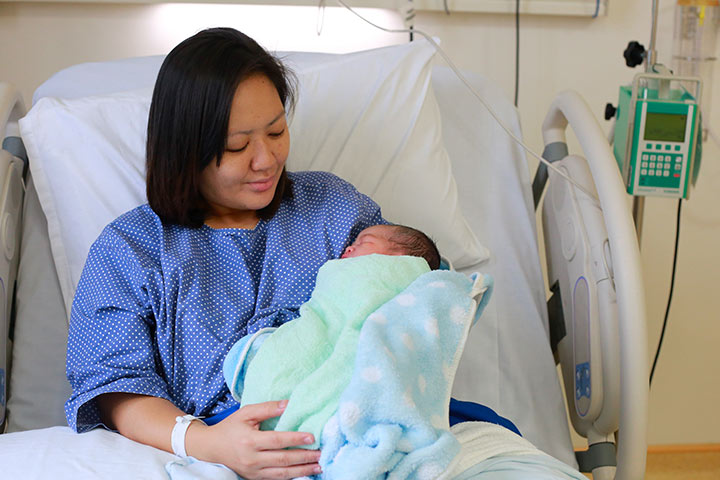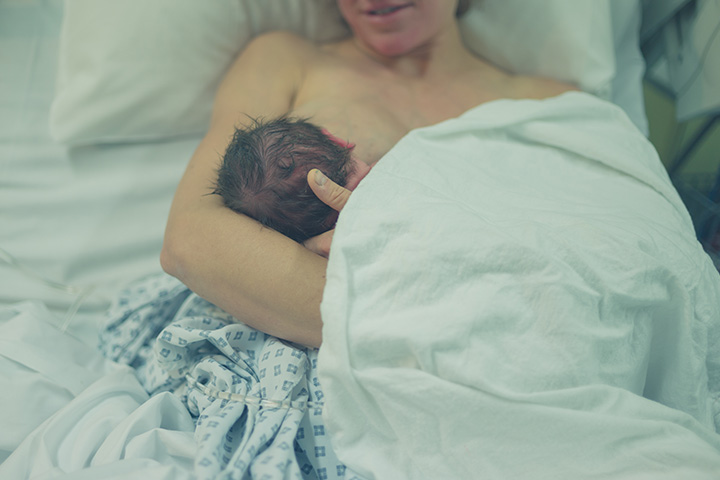
Image: Shutterstock
The moment a woman comes to know she’s pregnant, she’ll have a thousand curious questions on her mind. While she can easily find an answer to these on the internet, books, personal experiences, and even from her doctor, she might sometimes miss the finer details. For instance, she might not know what exactly transpires within the first 24 hours after delivery. These hours are, in fact, very important for both the baby and mother. So, if you too are an expectant mom, then let us give you a broad picture of what a mother goes through in the first 24 hours after birth. Here goes:
1. You’ll Bleed A Lot
Irrespective of the kind of delivery you’ll have, either vaginal delivery or a C-section, one thing is for sure – you’ll bleed a lot. Immediately after delivery, your body will eject all the excessive blood and tissues inside your uterus. This bleeding and discharge is called Lochia and is generally bright red in color. At times, some amount of clots might also appear, which is normal (1).
2. Skin-To-Skin Contact
Skin-to-skin contact is when the baby is laid on the mother’s bare chest for some time. According to research, it has various benefits including improved mother-baby bonding, promoting breastfeeding, regulates newborn’s body temperature etc (2). So, you’ll be asked to snuggle your baby.
3. You Might Require Stitches
If you’ve had a C-section, you’ll definitely require stitches on your tummy. Even in a vaginal delivery, sometimes a small surgical incision called episiotomy is made in the area to assist in childbirth (3). This too requires to be stitched back after delivery.
4. You’ll Have Some Pain And Swelling
If you’ve had a vaginal delivery, you’ll experience pain and swelling in your perineum region which is the area between the anus and vulva (4). Your doctor or the nursing professionals will surely guide you in regards to pain relief options. But you can also do your bit by lying down and resting as much as possible. Avoid standing for long hours.
5. You’ll Be Asked To Pee/Poop
One of the immediate things you’ll be asked to do soon after your stitches are done is to pass urine. You’ll naturally be scared, but the nursing staff will help you. Women who’ve had a C-section might be asked to rest for some more time before being asked to pee. Also, you’ll be required to keep yourself well-hydrated in order to avoid constipation, which can cause you a lot of discomfort while passing stool.
6. You’ll Be Mixed Bag Of Emotions
Giving birth to your bundle of joy will surely leave you overwhelmed. But, you’ll also feel exhausted and relieved at the same time. In fact, you’ll be completely awash with a range of emotions. Because it’s a nine-month-long journey that had just culminated with your little angel arriving in this world!
7. You’ll Lose A Bit Of Weight
At the beginning of your pregnancy, you’d have been worried about your weight gain. But what if you could lose some amount of weight in just one go?? Sounds delightful, isn’t it? While you might not lose your actual flab, but soon after delivering your baby, some amount of excess weight does go off your feet!
8. The Breast Milk Volume Will Be Low
Immediately after birth, your breasts will produce thick and yellowish breast milk called colostrum. It will be very scant in volume, yet enough to meet your newborn baby’s nutritional needs (5). As your baby continues to breastfeed, your breasts too will eventually start producing more milk. So, you need not be concerned about making enough milk (6).
9. You’ll Face Trouble Latching Your Baby On
No matter how much you learn the latching techniques before delivery, you’ll still face some amount of difficulty in getting your baby to latch on. Because, isn’t it obvious, that your baby doesn’t have any idea at all? However, with some help and practice, you and your baby will soon get a hang of it.
We are sure some of the things mentioned here might have come as a surprise to you. But now that you know, we hope it helps you brace yourself for the new challenges that come your way after childbirth. All the best!





















